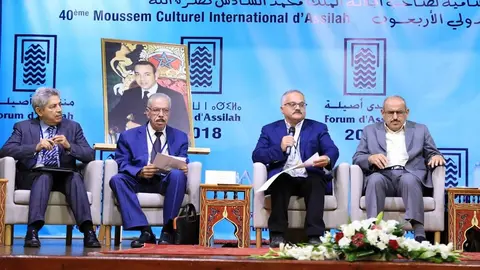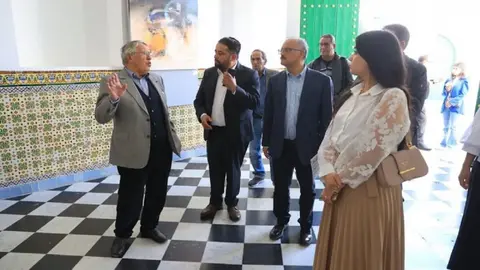Late Haitham El Zobaidi in critique of the present and the questioning of the future

- The defeat of the intellectual
- Literary alienation
- Advanced technology in backward hands
- Critical reviews and scientific criticism
It is a culmination of the thought-provoking questions raised by the late Haitham El Zobaidi, which evoke curiosity, passion, dissatisfaction and a quest for more.
This is a book not so much aimed at introducing the reader to Dr El Zobaidi’s, who passed away just a few weeks ago, but rather at bringing us closer to his way of thinking. It is difficult to define Dr Zobaidi in any simple way; in the end, every definition falls short. He was a person with a scientific and analytical mindset, but also a sharp observer of literary, political and social phenomena. He crafted his thoughts by combining the right blend of ideas and eloquence. He was also a bold critic and could write on history, music and visual art criticism, just as easily as he could write about mathematical shifts or the calculation of quantity and pressure effects in thermodynamics or high-pressure vessels.
The testimonial book, which was released a few days ago, is a reflection of the questions El Zobaidi raised over the years. These questions are laced with curiosity, passion, discontent and a desire to explore, which he had shared in articles published in the Al-Jadeed magazine.
The value of this book lies in its ability to preserve El Zobaidi’s thoughts within the annals of critical history, allowing future generations to return to his legacy and compare it to the evolving culture and society. The volume presents an objective critique of Arab cultural realities, emphasising the need for renewing intellectual tools and activating the role of culture in facing contemporary challenges.
The articles in this book, divided into six sections, represent a clear call to reconsider the relationship between culture and society. They stress that true change begins with awareness and knowledge.
El Zobaidi does not attribute the decline in interest in culture solely to economic crises, but also to the lack of awareness regarding the importance of culture in the lives of individuals and society. He criticises the prevailing view that culture is a luxury, affirming that the fundamental issue lies not in the lack of material resources but in the absence of interest.
The crisis of the Arab intellectual, according to El Zobaidi, is summarised in his inability to interpret the profound transformations in Arab societies, especially with the rise of religious extremism. El Zobaidi found that the traditional intellectual tools were no longer sufficient to understand the complex reality. This realisation calls for the development of new tools that would enable the intellectual to engage with the current changes.
The content of El Zobaidi’s book “A Witness to the Fourth Era” includes six sections. In his reflections over the transformations of the intellectual and identity, he raised some of the most urgent questions without offering clear answers; questions that the Arab intellectual has struggled to respond to. When analysing the state of culture, media and the digital space, El Zobaidi speaks as a witness who lived with the ailments of this milieu and felt its pain.
He also returns to his London exile, where he spent nearly four decades, in the section on living memory and isolation. He acknowledges that he cannot detach himself from society and politics, as he is an inherent part of both. In the fifth section, readers are introduced to a more personal side of Haitham El Zobaidi. Finally, in the last section, he offers his intellectual reviews not as a theorist or literary critic, but rather as an observer and, first and foremost, as a reader.
The defeat of the intellectual
Without claiming any authoritative or critical role for himself, or making any other assertions about social legitimacy or theoretical privilege, El Zobaidi simply adopts the role of a follower and a reader. He calls on the Arab intellectuals to recognise that they have suffered a major defeat in recent years. This defeat, according to El Zobaidi, was rooted in methodological flaws.
He says, “The problems faced by the intellectuals at the hands of authoritarian governments seem like superficial wounds compared to the deep blows they have received from the dangerous intellectual invasion that has shaken our region in the current era.”
Thus, the Arab intellectual, according to El Zobaidi, has been unable to provide intellectual interpretations or even to describe what is happening in the bloody scene that surrounds him.
The tools that the intellectual had relied upon for more than fifty years, since the era of independence, have been inadequate. He discovered that these tools, which were not home-grown, were designed to discuss and analyse Western liberal or Eastern Marxist intellectual and political phenomena. However, they are certainly not suited to interpret the religious and political fragmentation that has become the reality of the Arab region today.
Just as politics imposed the reality of the “pre-state era,” it also imposed the reality of the “pre-modern Arab culture era.” In this way, El Zobaidi describes the current Arab scene as a simultaneous “civil war” and “global war.”
On another level, he never ceased stressing the urgent need for a “new” enlightened intellectual. He offered a fundamental definition of this intellectual who must create and develop his own tools in an attempt to explain the region’s calamities, and labour to use them in constructing a new culture and thought.
He writes, “Borrowing the tools of others has created the intellectual’s alienation from the people, and has only led to the intellectual’s detachment from reality and the people’s detachment from him. The ‘naive’ came along and took the intellectual’s place.”
However, El Zobaidi does not stop at this fundamental critique when he suggests the “Ten Commandments” for the Arab intellectual. He argues that intellectuals and thinkers do not evolve for “marketable” reasons; rather, these reasons must be genuine. There are many cognitive tools available that could pave the way for an intellectual and cultural revolution in our societies, one that is built on real causes. El Zobaidi expresses his astonishment at our repeated failure to seize these opportunities. He says, with a hint of pessimism: “Perhaps the time has not yet come!”
Literary alienation
When the exiled writer reflects on his own exile, which has spanned four decades, he questions whether we can continue to use the term “literary alienation.” He justifies this by his personal and cultural experience of exile and claims that literature in exile is a non-existent entity.
He says, “This does not mean that I am an expert on literary production, whether local or émigré. But when decades pass without the phenomena catching your attention, it becomes your right to ask: where is this literary alienation?”
So, where is the problem? El Zobaidi asks: all the elements of literature are present. Does our literature receive British or French passports to become exiled like its counterparts?
The problem is that the owners of this literature are not exiles. They are geographically displaced for personal, political and material reasons. They read publications in Arabic, watch Arabic satellite channels, and recently, they have been tweeting in Arabic about Arab issues on social media platforms. They post in Arabic about the concerns and issues of their original homelands.
He openly and somewhat embarrassingly explains, “Many writers and intellectuals have not even attempted to learn, and I do not say master, the language of the country they reside in. In their vocabulary, they have 500 or 1,000 words that help them with shopping and visiting the doctor. Beyond that, they remain entrenched either in their small communities from the ’90s and the early millennium, or on social media networks after the rise of tablets and smartphones.”
El Zobaidi puts the exiled intellectual to a simple and realistic test: “try to have a conversation with an Arab intellectual in English, for example, in London. Even if he has lived in the city for years, you will be shocked by the shallowness of his language. He will occasionally mention a Western writer he has heard of. You will listen, then leave him for a month or two, and ask him about it. Most likely, he will not remember his name or his works. He will not recall, or never knew, the name of the British foreign secretary.”
If media is the vital part of culture, whether high or low, according to the English classification of culture, El Zobaidi was far more preoccupied with media than with culture itself. He stands perplexed in front of television culture in particular. There is a deeply-ingrained antagonistic stance towards this culture among intellectuals, including writers. They do not deny its spread and popularity, but they do not like it. While El Zobaidi attributes this to psychological, historical and practical reasons, the experience has taught us that the “Arab writer” plays the victim role inwardly, even as he outwardly rejects what he secretly craves for.
Advanced technology in backward hands
The author of the book, published weeks after his painful passing, draws closer to social media platforms and refuses to accept the notion of an “ultimate guide” on Facebook pages, or a leader before whom the world stands in respectful awe. “There is no head of the political office for the party of those gathered for happiness, anger, or the rights of bees. Everyone is equal, like the teeth of a comb.”
In superficial minds that cannot focus in the Facebook era, he observes that many of us are no longer able to concentrate on ideas as we could ten or twenty years ago. There is significant noise around the individual’s mental space today, preventing deep reflection. The abundance of information and its rapid turnover block the focus on its meanings. There is real saturation, making it natural for one to push aside a part of their thoughts, perhaps every hour or two, to make space for the upcoming flood of information.
He attributes the intellectual and psychological chaos experienced by the peoples of the world today, not just our own, to jumping between the broken ends of an equation without pause. The confusion of these parts is what hinders the ability to arrive at correct conclusions.
He writes boldly, “All the computers, smartphones, and satellite channels in the world will not be able to change the surface-level mind’s ability to reach correct understanding as long as the approach remains inadequate.”
In this section, El Zobaidi makes a brilliant diagnosis when he compares advanced technology falling into backward hands, creating a grand illusion of progress. Some even go so far as to equate technology with science. This equivalence turns the illusion into reality, assuming that the availability of technology in a society is a recipe for development and progress.
He says that “such a misunderstanding makes a car driver appear to be a professor of mechanical engineering simply because he can use car-driving technology. We all know that this is not true.”
Technology is not consciousness; it is merely a tool. Our need for consciousness, according to El Zobaidi, is greater than our need for technology. Consciousness is what keeps instincts in check. Conscious people live in harmony with themselves, both before and after technology.
The aware writer positively impacts society, even if his pages are printed on stone or lead slabs. The deceitful writer will find his solution in modern technologies. The national politician influences a few people, creating a critical mass from which reforms spread to the rest. He will not need the strife sown by the whispering devil through social media networks.
Thus, El Zobaidi concludes that the illusion of technology as a solution to our problems is a dangerous illusion that must be confronted like any pandemic that could destroy people. The trick of technology in backward hands no longer fools us.
Critical reviews and scientific criticism
In his critical reviews, El Zobaidi demands that “criticism should not be objective! The claim that criticism should be objective has no place here. Non-objective criticism is not truly criticism; it is either bias or propaganda. The more important point is that criticism should be scientific.”
This is a dangerous pitfall. The danger lies in the fact that it has led to entirely non-objective critical readings, presented solely because the author is either a specialist in a scientific field or an unqualified reader who flicked through some scientific pages, got excited by some words and terms, and attempted to “colour” his critical text with them.
In all of this, El Zobaidi is not enthusiastic about literature. Perhaps his scientific mindset led him to favour serious research over the pleasure of poetic imagination, but when the situation demands it, he writes with a confidence that sparks the reader’s curiosity, as shown in this book.
For example, consider what he wrote about Nizar Qabbani: “his beautiful poetry collections are the full record of a history that never happened in the Arab world. They record the danger of dreaming and the consequences of lost hope. What beautiful poems describing catastrophe! A successful poet who passed away, taking failure with him to the grave.
“With every poetic offering, Nizar’s audience’s appetite grew. He became part of the Renaissance phenomenon that marked the 1950s and 1960s. Simple speech without complexity or pretension, speech that challenges and stirs. Nizar wanted his poetry to be a social recipe for liberation and the removal of social injustice against women. His bet was huge: at least half of society, represented by women, and a considerable portion of men. A time passed for Nizar, the social reformer, where he saw that his dreams were on the path to being realised.
“But the fate of the Middle East was waiting for him and for us; everything shattered. Poetry of hope has now become poetry of disasters.”
El Zobaidi sums up Nizar Qabbani’s life with the ultimate conclusion: “the rise and fall of a generation’s hope in the modern Arab state”.
As for when El Zobaidi opens the window to the novel, he welcomes us into its dull world!
He writes, “There is something unappealing about reading a contemporary Arabic novel, or you might stop reading it after a few pages. It is hard to describe this ‘something,’ but we can say that many contemporary Arabic novels seem to belong to another dimension. The ironic thing in this paradox is that you read a novel to be taken to another dimension, but it is a dimension quite different from the one our contemporary Arabic realities take you to.”
He wonders, then, what is the flaw in contemporary Arabic novels that makes them repellent or at least unattractive?
He offers the answer: “Contemporary Arabic novels seem trapped in specific issues. Their world feels as though the hands of the clock stopped at a particular time: the time of preaching and lecturing, more than the time of description and delving into characters. The purpose of the narrative seems to be far from building the scenography of the novel and its characters, but rather it approaches a psychological stance of the novelist, which is often poured into a few pages, leaving the rest as repetition or meaningless filler.”


